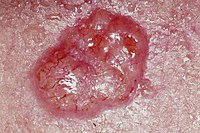
Photo from wikipedia
Hyperactivation of eIF4F-mediated translation occurs in many if not all cancers. As a consequence, cancer cells aberrantly enhance expression of malignancy-related proteins that are involved in cell cycle progression, angiogenesis,… Click to show full abstract
Hyperactivation of eIF4F-mediated translation occurs in many if not all cancers. As a consequence, cancer cells aberrantly enhance expression of malignancy-related proteins that are involved in cell cycle progression, angiogenesis, growth, and proliferation. With this in mind eIF4F is a promising molecular target for therapeutics that counteract pathological eIF4F activity. Here we used 4EGI-1, a small-molecule inhibitor of cap-mediated translation that disrupts formation of the eukaryotic initiation factor 4F (eIF4F) complex to treat non-small cell lung cancer (NSCLC). Treatment of cells with 4EGI-1 reduced cell proliferation, decreased cap-dependent complex formation, induced apoptosis, enhanced sensitivity to gemcitabine, and altered global cellular translation. Suppression of cap-dependent translation by 4EGI-1 resulted in diminished expression of oncogenic proteins c-Myc, Bcl-2, cyclin D1, and survivin, whereas β-actin expression was left unchanged. In light of these results, small-molecule inhibitors like 4EGI-1 alone or with chemotherapy should be further evaluated in the treatment of NSCLC.
Journal Title: Cancer Gene Therapy
Year Published: 2018
Link to full text (if available)
Share on Social Media: Sign Up to like & get
recommendations!